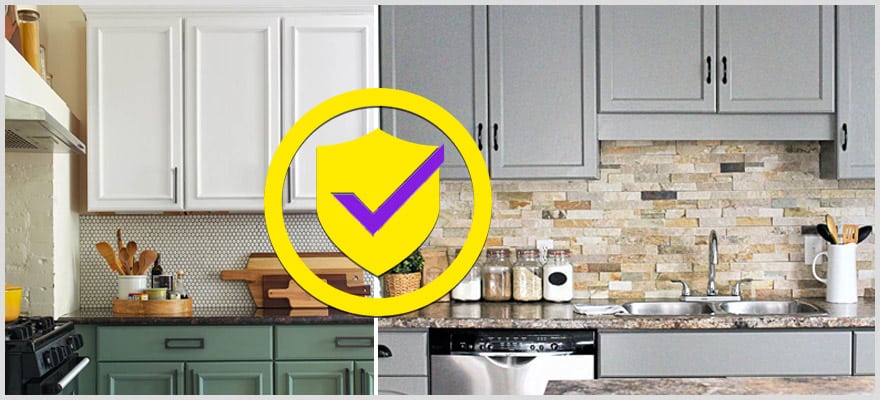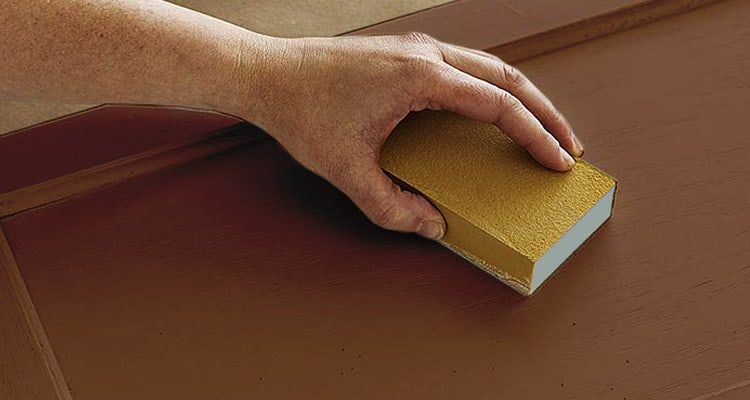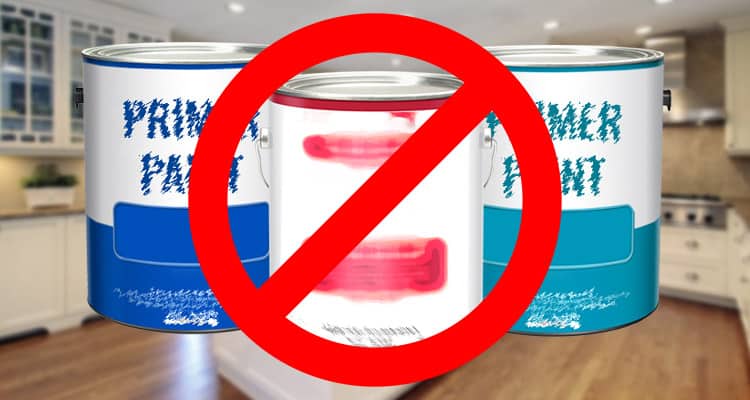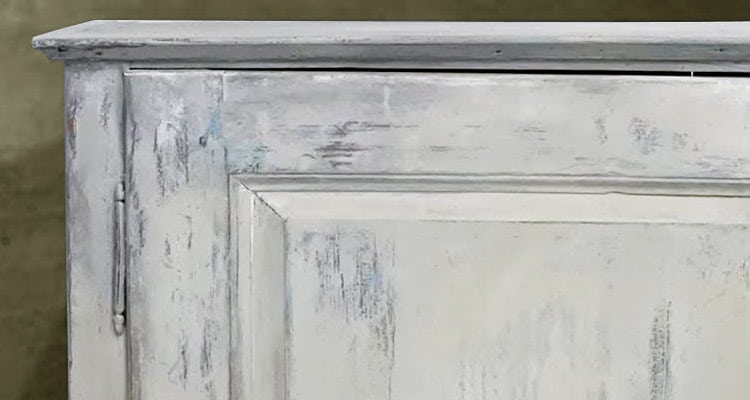There’s no doubt about it. The kitchen is the heart of any home, and redesigning it is definitely one exciting job.

Now, unlike other rooms, the kitchen is a complex place that equips various things like your sink, stove, cabinets, refrigerator and other electrical appliances for cooking and storing different items to eat.
Choosing a perfect look for the cabinets is one of the most difficult aspects while renovating your kitchen. It becomes even more difficult due to the wide range of options available for kitchen cabinets. You can literally refresh your kitchen in so many ways these days it’s mind boggling.
Though it is easy to select the size and type, one spends a lot of time in deciding the type of paint they can use for their cabinets.
Being a homemaker myself, I spend a lot of time cleaning and decorating my house. Also, I keep trying various DIY options to redecorate my kitchen (and often my house).
Meaning, I have painted my cabinets three times since 2013! Yep, I have been a homemaker since then.
As you have landed on this page, I am sure you are planning to give a whole new look to your kitchen cabinets. And maybe you are stuck with several questions and doubts.
Which product shall I use? Do I need an expert? How am I supposed to go with this painting process?
Hey, hey, I understand, take a ‘chill pill’! ;)
My last experiment with kitchen cabinets was around 2 years ago, in mid-June and to be honest, I am satisfied with what my kitchen cabinets look like. I used chalk paint, one of the most user-friendly type of paint ever. Trust me, I have tried around 3 products already.
However, every product comes with its pros and cons. Let’s have a look at some positives and the negatives of this product, and see if it’s durable enough for kitchen cabinets:
The Pros Of Using Chalk Paint For Kitchen Cabinets
Minimum Prep Required

Painting the cabinets with chalk paint does not need detailed or meticulous preparation. You already know that your kitchen needs to be organized ( and clean). So this benefit of chalk paints can really help you save time.
All you need to do is wash the cabinet with some soap and warm water. This step is important as you need to remove the grease to make sure you apply the paint evenly.
In case you are looking for an alternate method of cleaning the cabinet, you can grab a sandpaper and rub it through the surface of the furniture. You need to rub it lightly because you sure don’t want to rip-off the furniture!
There’s No Need Of A Primer

Unlike most paints, chalk paints do not require a primer to sustain. You need not coat your furniture with a primer paint to protect the furniture and ensure better adhesion. Chalk paints are truly low-maintenance paints, you don’t need a lot of pampering or preparations.
Easy to Paint
Painting the cabinets using chalk paints is not a big deal. It spreads very easily. Nonetheless, applying chalk paint can be a little time consuming as you might have to apply at least one coat wax or varnish over the chalk paint cabinet layer.
But hey, did I mention this? This paint dries fast. I mean super fast!
How fast? Well, get this, the paint on the first door dries by the time you finish applying the paint on the second door! So basically, you can apply the second coat right after you finish the first one. Isn’t that super quick?
The Distressed Look

Apart from being an easy paint to apply, this is the second reason why I love chalk paints. I am a fan of that ‘distressed’ and antique look. So once these chalk paints get older, they give a superb look to the furniture.
Some More Chalk Paint Pros Include:
- -Dries quickly
- -May not require sanding
- -Can be thinned for extended application
- -Chalk paints are more flexible
- -Finished surfaces look richer and more elegant
- -Easily applied using a sprayer
- -Great colors for vintage paint jobs
- -Very forgiving of “mistakes”; easy to fix
- -Ideal for “artsy techniques”
- -Easy clean-up; wipes up beautifully
- -Distinct finishes not found in other types of paint
- -Low VOCs; very little paint odor
- -Competitive brands are broadening the market
- -Availability is improving
- -You don’t have to buy special brushes.
Chalk Paint Cons
Now, there sure are some chalk paint cons as well. Let’s see them below.
Limited Color Options
Chalk paints come with limited options. So if at all you are expecting a wide range of shades like you might maybe see in lipsticks and nail polishes, chalk paints are not for you. You won’t find colors like “ruby woo” or “electric neon” here. ;)
Chips Easily If Not Waxed

Although applying wax on chalk paint is time-consuming, you SHOULD apply wax. If you skip this step due to well, being lazy, all the hard work you would have put into painting the furniture will go in vain. Yep, as the paint is nothing but chalk, it chips away with time.
And hey, skipping this step and saving the time today will only lead you to fill the chipped portions every few months. So applying wax will, in fact, save you from frequent touch-ups for at least the subsequent 2 years.
Some More Chalk Paint Cons Include:
- -Chalk paint products are expensive
- -So are sealants associated with chalk paint
- -Often confused with “blackboard paint”
- -In some cases, priming may be required
- -Could take up to 4 coats to achieve color consistency
- -May leave brush marks on surfaces
- -Subject to stain bleeds, especially on reddish woods
- -Requires application of labor-intensive sealant
- -Can be hard to find designer brands
- -May require re-sealing down the road
- -Sanding may be necessary if surfaces aren’t pristine
- -Wax sealants can’t be buffed for an additional 24 hours
About Chalk Paint
No parent has escaped the experience of coming home to find a youngster left examples of artistic work on walls or furnishings.
Kids don’t know the rules. Nor do they have to worry about re-painting wall areas covered in crayon art. Fortunately Annie Sloan adopted the philosophy, “If you can’t beat them join them!” She developed her signature medium, Chalk Paint®, in 1990, and the paint industry hasn’t been the same since.
Was she selfishly seeking a solution for her own situation? With three boys under the age of 7, her walls may have become a gallery of originals.
Turns out Annie and the parents who consider her a paint saint fell in love with the versatility and creativity that comes with chalk paint and decorators feel exactly the same way. Despite competitors, her signature paint brand is considered the epitome of these products.
What is there about chalk paint that thrills homeowners—-even those without kids? They apply easily and dry fast. You can use them to paint everything from walls to furnishings, though debates around sanding, priming and prep continue on.
Bottom line is that chalk paint never met a surface it couldn’t cover, including wood, metal, plastic, cement, brick and more. Ready to try chalk paint yourself? We give you the skinny on what you can expect from these products–and what you can’t.
What can you paint with chalk paint?
A better question to ask is “what projects can’t you undertake with chalk paint?” This list is just the beginning of projects that can be spruced up using chalk paint. Find more ideas on Pinterest here.
Here are some projects you can make with Chalk Paint:
- -Give an old hutch a new life by repainting it
- -Revive your dining room table by painting and sealing it
- -Apply chalk paint to indoor and outdoor benches
- -Turn your shabby desk into a chic piece of furniture
- -Update a buffet with chalk paint and new hardware
- -Give end, couch and coffee tables new looks
- -Beautify your kitchen cabinets using chalk paint
- -Use chalk paint to renew an old vanity table
- -Modernize your dresser using chalk paint
- -Paint dining room chairs to revitalize them
- -Showcase your entryway by repainting your front door
- -Update fireplace brick, tiles and mantles
- -Yes, you can use chalk paint on pianos and fabric cushions!
How long does chalk paint last?
According to the decorating pros running the Better Homes and Gardens website, the secret to a long-wearing finish applied to a project with chalk paint is allowing 24-hour drying periods between coats, thinking about that first coat as “a primer.”
Curing time is critical. Even Annie Sloan agrees. For a long-lasting finish, DIYers are wise to add a thin coat of wax to seal chalk paint so it’s protected.
Follow this plan, says Annie Sloan worshipper The Purple Painted Lady, and “you never need to be concerned about what this paint will look like 10 years from now!”
Is chalk paint waterproof?
Bottom line answer to this question is “not always.” Avid decorator Sarah Joy recounts her tale of using chalk paint to revive classic dressers and turn them into bathroom vanities on her website’s blog.
She followed the rules, including the use of an Annie Sloan clear wax. A month later, she discovered flaws, chips and water damage.
“So I sanded down the bad spots and did the whole painting and waxing combo again. This time using two coats of wax.”
Nothing changed. Sarah says that if she had it to do over, “I should have used a clear polyacrylic to protect the top of the dressers instead of using wax.”
Take this as a cautionary tale if waterproofing is critical to the wellbeing of your chalk paint project.
Can you make your own chalk paint?
Having learned that, in many cases, the sealant you use to protect surfaces painted with chalk paint can make all of the difference, it stands to reason that creative folks on a budget might like to try making their own chalk paint.
This is just one of the recipes floating around the Internet that you can try. It’s only got 4 steps. Start with a small item (photo frames?) to see how you fare before tackling bigger projects.
- Dissolve ½-cup plaster of Paris in ½-cup warm water.
- Add 1½-cup of any color latex paint to the plaster of Paris mix.
- Use a brush or sponge to paint the item. Dry 24 hours before applying a second coat and an additional 24 hours between additional coats.
- Use a paste wax or sealant to finish the piece after the final drying.
Final Words
Being a home decor enthusiast, I always try out all the weird home ideas to embellish my house. Chalk paints being one of my experiments, I was definitely not disappointed by the results.
It gave my kitchen a simple yet beautiful look, and to be honest, I am loving the vintage look it is giving out every passing day.
Related Posts
- 11 Ways to Get Rid of Cooking Smells in a Small Apartment or House
- Comparison of Corian Countertops vs Laminate for Kitchens
- All About Fragranite Kitchen Sinks With Pros & Cons
- Comparison of Granite Composite Sink vs Stainless Steel
- How Much Does it Cost to Paint Kitchen Cabinets?
- What Color Granite Goes With Maple Wood Kitchen Cabinets?
Leave a Reply